
Kyoto University Hospital said the woman had surgery at 11 a.m. on Wednesday by a 30-member medical team to transplant lung tissue from her husband and son.
But the Kyoto hospital said this was the first case where lung tissue had been transplanted from living donors to a Covid-19 patient.
Dr. Hiroshi Date, a thoracic surgeon at the hospital who led the surgery, said it gave hope to patients suffering from severe lung damage from Covid-19.
“We have shown that we now have an option for lung transplants (from living donors),” he said at a press conference on Thursday.
The patient, identified only as a woman from Japan’s western Kansai region, was given Covid-19 late last year and spent months on a life-support machine that worked like an artificial lung, according to Kyoto University Hospital.
Covid-19 caused so much damage to her lungs that they no longer functioned, and she needed a lung transplant to live.
The woman’s husband and son offered to donate parts of their lungs. Transplants from brain-dead donors are still rare in Japan, and living donors are considered a better option, according to the hospital’s statement.
The husband and son are in a stable condition and the woman remains in intensive care. According to the hospital, she will be able to leave the hospital in about two months.